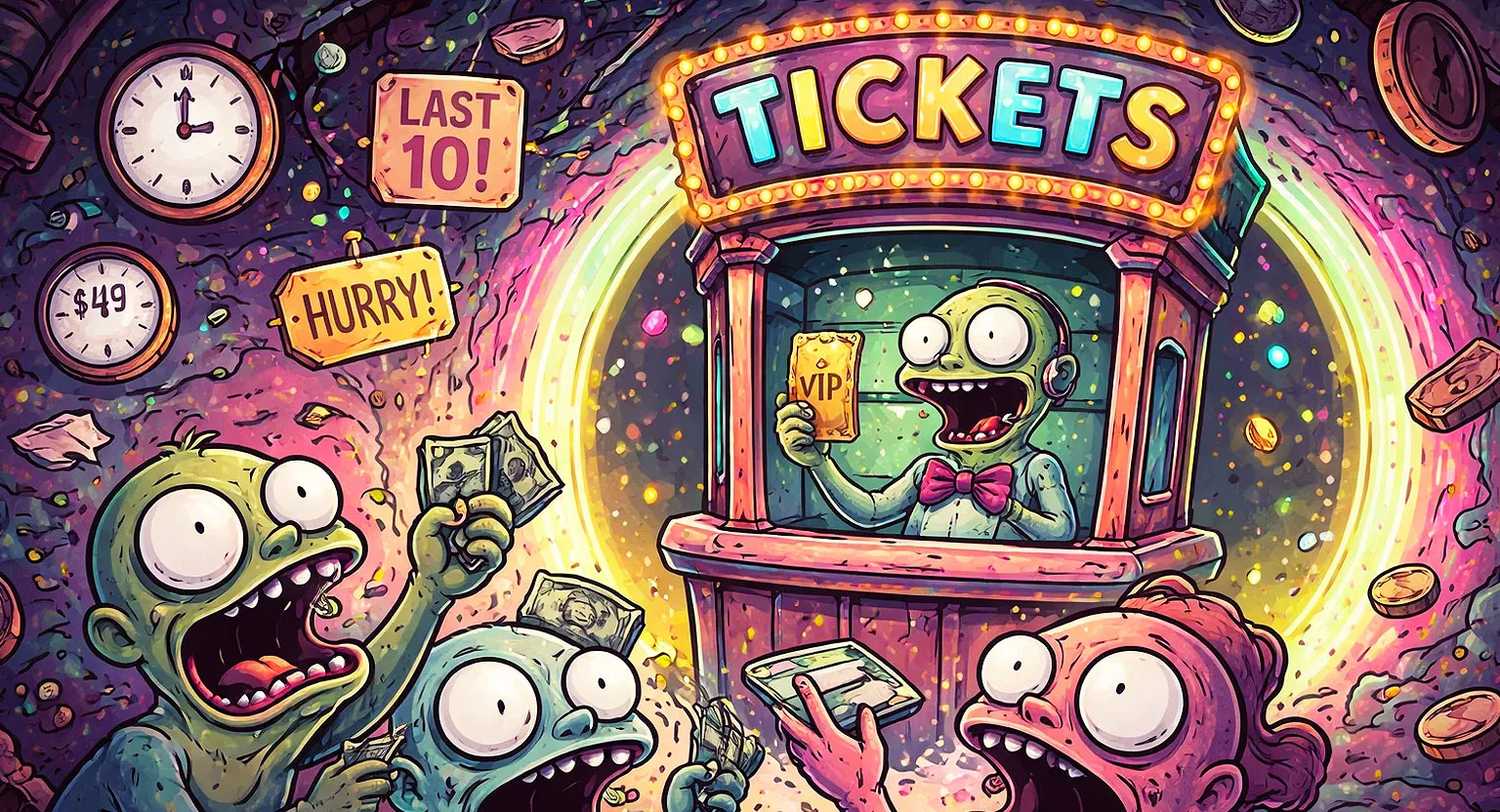In 2025, the ticket wars aren’t just about convenience; they’re a cutthroat fight for every dollar. Eventbrite’s complex maze of fees is now facing an aggressive flat-rate disruption from TicketsCandy. Which platform actually makes more money for organizers?
The competition in the ticketing market is huge! The global online event ticketing market size is projected to reach USD 89.44 billion by 2030. When event ticket purchasers in selected countries worldwide are compared, Finland has the highest share, with 52 percent of consumers falling into this category. Lithuania follows in second place, while Morocco ends up at the bottom of the ranking. In the fight for high income, every dollar counts. And it is extremely unprofitable to lose money on high commissions. Did you know Eventbrite service fees can eat up to 17% of your ticket revenue? Event organizers lose a big part of their potential earnings to these fees.
Eventbrite’s ticket selling system includes three different types of fees: a service fee of 3.7% + $1.79 per ticket, payment processing fees of 2.9% + $0.30, and extra fees between 1.5% to 3% based on event type. A $25 ticket loses $4.24 to fees – that’s 17% of your revenue gone. The effect remains huge on higher-priced tickets: $10.69 for a $100 ticket, $24.19 for a $500 ticket, and $45.69 for a $1000 ticket.
Eventbrite has 93 million unique ticket buyers, but these numbers might not justify their costs. Many organizers find Eventbrite’s outdated interface and confusing menu structure frustrating. The platform also charges attendees unexpected fees, with a typical $50 ticket costing an extra $3-$5.
This comparison of Eventbrite vs TicketsCandy will show you Eventbrite’s percentage from your sales, explain their pricing plans, and calculate their charges against alternatives. The guide helps you pick the best ticketing service for your 2025 events if you’re tired of losing your event revenue to platform fees.
Eventbrite Pricing Breakdown: What You Really Pay
Eventbrite’s pricing looks simple on the surface, but a complex fee structure can substantially affect your event revenue. You are counting on profit, and you don’t expect that huge commissions will eat up a significant part of it! Let’s analyze what you’ll pay to use their platform in 2025.
High Service Fees
Eventbrite’s core pricing model sets a fixed 3.7% plus $1.79 per ticket sold for U.S. events. This applies to every paid ticket and add-on sold through the platform. A standard $50 ticket results in $3.64 in service fees alone.
The platform calculates these fees based on the ticket price, not the total order amount. You have two choices about who pays these costs:
- Pass fees on: Your attendees pay fees above your ticket price (default setting)
- Absorb fees: Your ticket price includes fees, which reduces your revenue
Which option is better for you? Which one guarantees maximum user loyalty and your super profit?
Payment Processing
A separate 2.9% payment processing fee applies to the total order amount. Unlike per-ticket service fees, this charge happens once per transaction.
The payment processing fee calculation includes the full amount with service fees and taxes. A $20 ticket would incur $2.53 in service fees plus $0.65 in payment processing fees. This totals $3.18 per ticket – taking almost 16% of your revenue. A large sum, isn’t it?
Additional Regional Fees: UK vs US vs Germany
Each country has its own fee structure. Let’s get to the bottom of this complex maze of fees!
| Country | Service Fee | Payment Processing |
|---|---|---|
| US | 3.7% + $1.79 per ticket | 2.9% per order |
| UK | 6.95% + £0.59 per ticket | Not applicable |
| Germany | 5.5% + €0.99 per ticket | Not applicable |
The UK model differs with higher percentages but lower fixed fees. Australia, Germany, and the UK bundle payment processing into their service fees, eliminating separate charges.
Eventbrite Fees Calculator: Real-life Ticket Examples
These examples show how fees affect ticket prices:
For a $50 ticket in the US:
- Service fee: $50 × 3.7% + $1.79 = $3.64
- Payment processing: ($50 + $3.64) × 2.9% = $1.56
- Total fees: $5.20 (10.4% of ticket price)
For a $100 ticket in the US:
- Service fee: $100 × 3.7% + $1.79 = $5.49
- Payment processing: ($100 + $5.49) × 2.9% = $3.06
- Total fees: $8.55 (8.6% of ticket price)
It’s worth mentioning that Eventbrite’s fees remain non-refundable even if you refund a ticket. This adds risk for organizers who handle events with high cancelation rates. You can spend a lot of money and not make a profit!
In a nutshell, Eventbrite combines percentage-based and flat fees that vary by region. U.S. organizers face a dual-fee system that takes 8-16% of ticket revenue.
How Fees Impact Event Organizers
Event organizers must make tough money choices when they use Eventbrite’s platform. The fee structure affects more than just profits – it determines how you price tickets and what your attendees experience.
Absorbing vs Passing Fees to Attendees
Every ticket sale presents organizers with a basic decision: who should pay the fees? Eventbrite gives you two choices:
- Absorb fees: Checking “Absorb fees” means the fees become part of your ticket price and come out of your earnings. You’ll make less money but can show simpler pricing.
- Pass fees on: Leaving “Absorb fees” unchecked makes attendees pay extra fees on top of your ticket price. Your profits stay intact, but buyers might get sticker shock at checkout.
Eventbrite passes fees to attendees by default. Many organizers choose to absorb these fees to keep attractive prices, even though it cuts into their profits. Smart budget planning becomes essential since surprise fees often make buyers abandon their cart.
Revenue Loss on Low-Priced Tickets
Eventbrite’s fee structure hits low-priced tickets harder than others. The fixed $1.79 fee takes a bigger bite from cheaper tickets. A $5 ticket loses a much higher percentage to fees compared to a $100 ticket. So if you’re selling tickets to a budget event, you’re in for a tough time!
Some ticketing platforms charge just $0.49 for tickets that cost $5 or less. Eventbrite keeps its standard fees whatever the ticket price.
High-Volume Events: Scaling Challenges
Big events face heavy fee burdens that stay the same no matter how many tickets they sell:
- A $500 ticket adds $24.19 in fees per sale
- A $1,000 ticket costs $45.69 extra
- Premium tickets over $200 pile up more than $90 in fees each
Eventbrite doesn’t offer any bulk discounts – fees stay fixed no matter how many tickets you sell. This creates real problems for major events where fees can add up to thousands of dollars.
Refunds and Non-Refundable Fees
Eventbrite’s refund policy causes the biggest headache for organizers. Their ticketing fees never come back. The refund process works like this:
- Attendees get back the ticket price minus all ticketing fees
- Organizers lose the original fees even on refunded purchases
- Full fee refunds only happen for canceled events or double charges within a week
Organizers can choose to refund fees from their own pocket, but this cuts deeper into their already slim profits. Other ticket platforms return both ticketing and credit card fees for full refunds.
Eventbrite’s fee structure creates several challenges for organizers. From pricing choices to refund rules, these fees directly affect your profits and how happy your customers will be.
TicketsCandy’s Transparent Pricing Model
TicketsCandy brings a simple fee model that puts more money in organizers’ pockets, unlike Eventbrite’s complex tiered pricing structure.
Flat 0.9% Service Fee in the US, Free Elsewhere
US-based events pay a tiny 0.9% service fee with TicketsCandy, which beats Eventbrite’s hefty 3.7% + $1.79 per ticket. The deal gets better for organizers outside the United States who pay zero service fees.
A $50 ticket costs you just $0.45 with TicketsCandy compared to Eventbrite’s $3.64 in service fees. Your savings grow as ticket prices increase.
No Payment Processing Fees with Square
Square handles payment processing at no additional cost through TicketsCandy’s integration. Eventbrite charges an extra 2.9% payment processing fee that takes a bigger bite out of organizers’ profits.
The numbers tell the story clearly. You’ll pay about $8.55 in combined fees for a $100 ticket on Eventbrite. TicketsCandy charges just $0.90 – putting an extra $7.65 in your pocket for each ticket sold.
Daily Payouts and Instant Transfers
Event organizers need steady cash flow. TicketsCandy deposits your ticket revenue into your bank account daily, so you won’t wait weeks for your money. The platform also lets you transfer funds instantly when you need quick access.
Quick payouts help you handle upfront event costs right away – a huge advantage over platforms that hold onto your money until after events end.
Unlimited Ticket Types and Time Slots
You get unlimited ticket types and time slots with the basic package. This freedom lets you create detailed ticketing structures without paying extra fees or upgrading to premium levels.
TicketsCandy handles everything from early-bird deals to VIP packages and timed entry slots. The platform supports complex event structures without the extra charges common on other platforms.
TicketsCandy’s approach marks a new direction in event ticketing. The platform keeps costs low and maximizes revenue through clear, predictable pricing that rewards your success as you grow.
Feature Comparison: Eventbrite vs TicketsCandy
The way these platforms work can affect your event’s success way more than their prices. Let me get into how their features compare.
Customization: Branded Pages vs Generic Templates
Eventbrite lets you customize event pages, but many organizers find them too basic. Users often call their designs “too generic, not unique” with “restricted layout adjustments” and “minimal options for color scheme”. TicketsCandy gives you individual-specific event landing pages that showcase your brand’s personality better through media elements.
Marketing Tools: TikTok, Google Ads, Email Campaigns
Each platform shines differently when it comes to marketing. Eventbrite’s email marketing shows “open rates 59% higher than the industry average” and connects to Facebook and Instagram ads. TicketsCandy takes it further with complete integration options. You get “targeted advertising through Google and TikTok” and smooth “email marketing integration with leading platforms.
Checkout Experience: Apple Pay & Google Pay Support
Your checkout process can affect sales by a lot. Eventbrite made their checkout better. They moved optional questions after payment, which “increased conversion rates by up to 2x”. Both platforms work with Apple Pay and Google Pay. TicketsCandy talks about their “flawless checkout process” that makes buying tickets easier.
Team Collaboration and Access Control
Teams need to work together smoothly. Eventbrite gives you structured role management with “two default roles: owner and admin” and lets you “create other roles” with custom permissions. TicketsCandy matches this with features where “multiple team members can access the platform simultaneously” and “customizable access levels for different team roles”.
These platforms differ in how they handle customization and modern marketing tools. Eventbrite is reliable with its proven tools. TicketsCandy gives you more freedom with branding and newer marketing channels like TikTok. These differences could be vital depending on your event and audience.
Which Platform Saves You More in 2025?
The cost differences between these platforms paint a clear picture at the time we compare them. Let’s look at what this means for your bottom line in 2025.
Total Cost Comparison: $25, $100, $500 Tickets
The platform choice affects your finances more as ticket prices rise:
| Ticket Price | Eventbrite Fees | TicketsCandy Fees | Savings with TicketsCandy |
|---|---|---|---|
| $25 | $4.24 (17%) | $0.23 (0.9%) | $4.01 per ticket |
| $100 | $8.55 (8.6%) | $0.90 (0.9%) | $7.65 per ticket |
| $500 | $24.19 (4.8%) | $4.50 (0.9%) | $19.69 per ticket |
Yes, it is worth noting that Eventbrite’s combined fees can eat up up to 17% of revenue on lower-priced tickets. This happens because of their fixed $1.79 per-ticket fee. Event organizers selling 1,000 tickets at $100 could save about $7,650 by switching platforms.
Long-Term Value for Recurring Events
The financial benefits add up quickly for recurring events. TicketsCandy gives you daily payouts, which helps manage cash flow better than Eventbrite’s delayed payments. The platform doesn’t charge setup fees or monthly subscriptions, making it an economical solution for organizations that host regular events.
TicketsCandy’s transparent pricing removes the guesswork from cost prediction. Their flat 0.9% service fee lets organizers calculate their exact costs. This beats having to deal with Eventbrite’s complex tiered pricing structure.
Best Fit by Event Type: Small, Large, or Niche
Small events with tight budgets benefit from TicketsCandy’s low fees that protect vital margins. The platform works best especially when you have ticket prices under $50, where Eventbrite’s fees take a bigger bite.
Large-volume events see the biggest gains with TicketsCandy’s model. Without Eventbrite’s fixed $1.79 per-ticket charge, this is a big deal as it means that savings grow with attendance.
Niche events, including nonprofits and educational institutions, benefit from TicketsCandy’s simple pricing. You won’t have to deal with Eventbrite’s varying fees based on country and category. This makes international or specialized events more profitable.
The financial gap between these platforms in 2025 could make or break your event’s success – especially if you run on thin margins or plan to scale your event business.
Comparison Table
| Feature | Eventbrite | TicketsCandy |
|---|---|---|
| Service Fee (US) | 3.7% + $1.79 per ticket | 0.9% |
| Payment Processing Fee | 2.9% per order | No extra cost (Square integration) |
| Total Fee Example ($50 ticket) | $5.20 (10.4%) | $0.45 (0.9%) |
| International Pricing | Varies by country (UK: 6.95% + £0.59, Germany: 5.5% + €0.99) | Free (No service fees outside US) |
| Payout Schedule | Not specified | Daily transfers with instant transfer options |
| Refund Policy | Non-refundable fees | There is a refund |
| Ticket Types | Not specified | Unlimited ticket types and time slots |
| Marketing Features | Email marketing, Facebook & Instagram ads | TikTok, Google Ads, email marketing integration, etc |
| Payment Methods | Apple Pay, Google Pay | Apple Pay, Google Pay |
| Page Customization | Limited templates, restricted layout adjustments | More customized event landing pages |
| Team Management | Owner and admin roles with customizable permissions | Multiple team access with customizable levels |
| Volume Discounts | No volume discounts | Not mentioned |
Conclusion
A deep look at Eventbrite and TicketsCandy reveals a clear choice for event organizers who want to maximize their revenue. TicketsCandy proves to be a more economical Eventbrite alternative that saves organizers anywhere from 7% to 16% of their ticket revenue.
Let’s talk numbers. Eventbrite’s fee structure takes a big bite out of your earnings with its 3.7% + $1.79 per ticket plus 2.9% payment processing fees. TicketsCandy keeps things simple with just a 0.9% service fee. This huge gap means real money in your pocket – a festival selling 1,000 tickets at $50 would save $4,750 by picking TicketsCandy.
TicketsCandy’s practical benefits make it even more attractive. You get your money faster with daily payouts, and you can create as many ticket types and time slots as you need. No restrictions hold you back.
The benefits get better for international events. Eventbrite hits you with different (often higher) fees in various countries. TicketsCandy? Zero service fees outside the US. Global event organizers can really cash in here.
Eventbrite has a 10-year-old marketplace with millions of users. But its dated interface and confusing menus just get in the way. TicketsCandy counters this with custom event pages and modern marketing tools like TikTok and Google Ads.
Your event’s specific needs should drive your choice. Some organizers might still prefer Eventbrite’s built-in audience despite the hefty fees. All the same, TicketsCandy offers clear financial benefits and matching features that make it the smarter pick for budget-conscious planners in 2025.
The bottom line? Unless Eventbrite’s marketplace presence justifies giving up 17% of your revenue, TicketsCandy delivers better value for events of all types, sizes, and budgets.
FAQs
Q1. How do Eventbrite’s fees compare to TicketsCandy’s? Eventbrite charges 3.7% + $1.79 per ticket plus 2.9% payment processing, while TicketsCandy has a flat 0.9% service fee in the US and no fees elsewhere. This can result in savings of 7% to 16% of ticket revenue with TicketsCandy.
Q2. What are the main differences in features between Eventbrite and TicketsCandy? TicketsCandy offers more personalized event pages, integration with modern marketing platforms like TikTok, and unlimited ticket types. Eventbrite provides a large marketplace but has a more restrictive interface and limited customization options.
Q3. How do payouts work for each platform? TicketsCandy provides daily transfers with instant transfer options, allowing for better cash flow management. Eventbrite’s payout schedule is not specified, but it is generally known to have delayed payments.
Q4. Are there any advantages of international events on either platform? TicketsCandy charges no service fees for events outside the US, while Eventbrite has varying (often higher) fees across different countries. This makes TicketsCandy particularly advantageous for global event organizers.
Q5. Which platform is better for small vs. large events? TicketsCandy is generally more cost-effective for both small and large events due to its lower fees. It’s particularly beneficial for events with ticket prices under $50 and high-volume events, where Eventbrite’s per-ticket fees can significantly impact profits.






